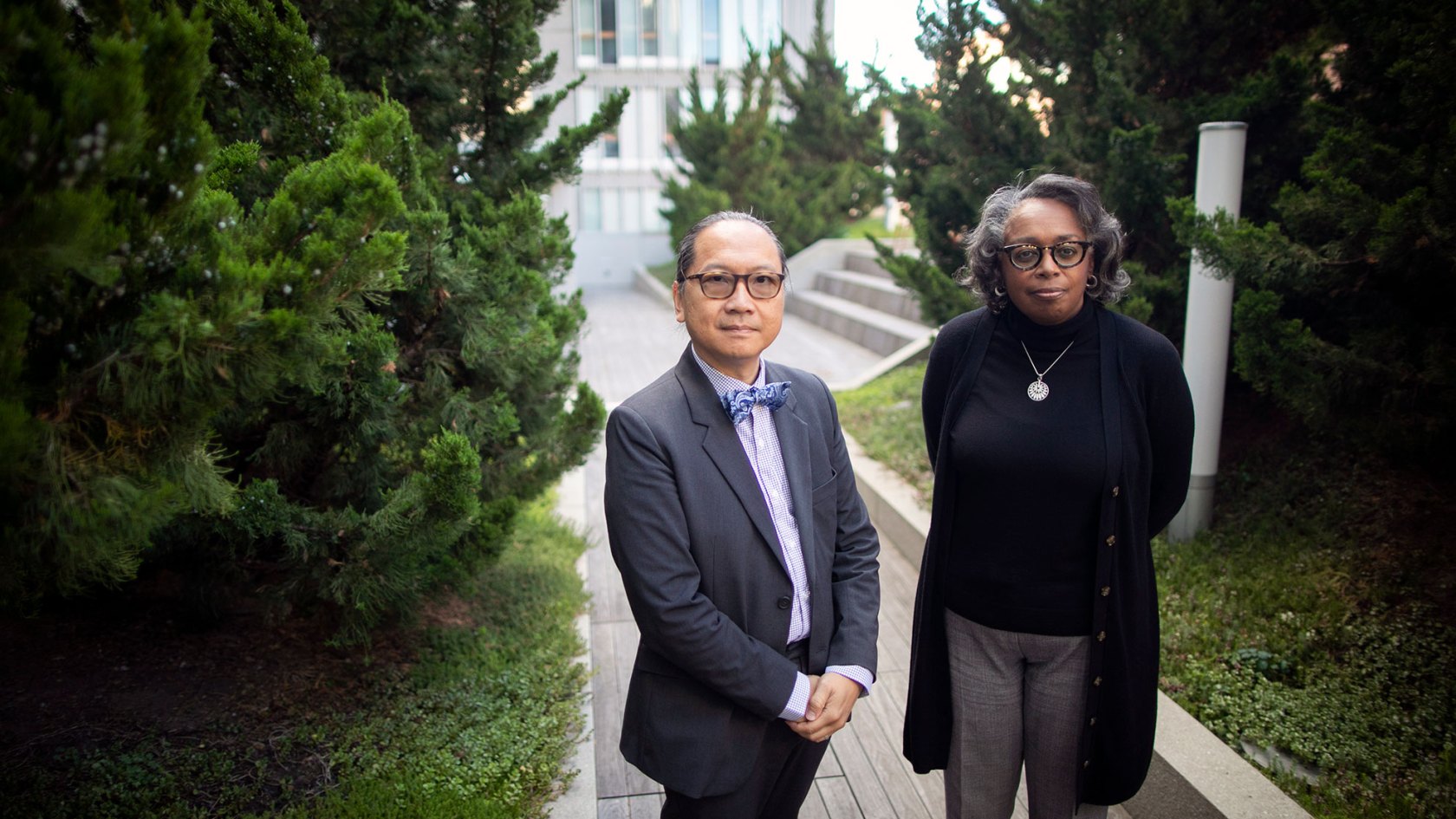
Giang Nguyen (left) and Robin Glover.
File photo by Stephanie Mitchell/Harvard Staff Photographer
Healthy Minds Survey asks students about mental health
University will use results to tailor resources and support to students’ needs
On Wednesday the University will launch the Healthy Minds Survey, which asks all degree-seeking undergraduate and graduate students about their current mental health, as well as their awareness and utilization of Harvard’s mental health resources and support. Sponsored by the Provost Office of Student Affairs and University Health Services, the confidential survey will be open until April 23.
The survey, developed at the University of Michigan and administered at hundreds of colleges and universities across the country, will provide Harvard with national benchmarking data to gauge progress and evaluate challenges related to student mental health. It is one of a series of steps Harvard has taken in response to the University’s Report of the Task Force on Managing Student Mental Health released in 2020.
To learn more about the survey and how the University will use its results, the Gazette sat down with Robin Glover, associate provost for student affairs, and Giang Nguyen, associate provost for campus health and well-being and executive director of Harvard University Health Services.
What is the Healthy Minds Survey?
Glover: The Healthy Minds Survey is a national survey based at the University of Michigan that has provided data for more than 15 years on the mental health of students in colleges and universities across the U.S. It includes a lot of the questions that we wanted to ask our students about their mental health and whether the resources and support we’re currently offering meet students’ needs. Without asking, we don’t really know how we’re doing. All of this information will inform decisions about any changes to the services and support we provide to our students.
Nguyen: The Healthy Minds Survey will also help us evaluate where we stand within the context of the broader mental health needs of college and university students all over the country. While the University has recently administered other surveys, such as the HESMA and Pulse surveys, Healthy Minds is the only University-wide survey specifically focused on student mental health and benchmarked against other universities.
How will the survey’s results be used?
Nguyen: In response to previous assessments of the student mental health experience, we improved student access to mental health support by implementing the 24/7 CAMHS Cares phone support line, providing access to TimelyCare for virtual mental health visits, and implementing a new clinical access coordinator team staffed by CAMHS licensed clinicians. We’ve also implemented campus-wide educational programs for members of our community to address mental health needs. Through the Healthy Minds Survey, we want to know whether our students know that these resources exist, what their experience has been with them, and which resources should be added or strengthened.
Periodically surveying students about their experiences and needs regarding health, and specifically mental health, is good public health practice. So, we will likely be conducting additional surveys every three years in the future.
Why is this survey important, and why should students take it?
Glover: We are really encouraging every student who is invited — every undergraduate and graduate student — to complete the survey. We want to hear as many different voices from as many different perspectives as possible. This will give us a complete picture of the mental health status of our students, as well as feedback about the programs that we offer here. A broad response across the University is important because an undergraduate student is different from a graduate student, and a professional student at the Medical School is different from one at the Business School.
What type of questions will be included and how long will it take?
Nguyen: In addition to asking about awareness and utilization of mental health services on campus, we do ask students to anonymously share with us their own experiences with mental health, which may include questions about depression, anxiety, body image issues, or other mental health diagnoses. We also ask questions about how connected they are with the community around them, as well as any exposures to trauma or substance abuse in the past. All of this feedback helps us to understand, in a more direct way, the experience of our students.
Glover: In total, the survey will take about 25 minutes, and we recognize that’s a significant commitment. As a thank-you for their time, students will receive a $15 gift card after completing the survey. Students may also exit the survey at any time, or they can pause taking it and pick it up again later using their personal survey link.
Mental health can be a difficult topic. How will the responses be kept confidential?
Nguyen: The folks at the national Healthy Minds Study have been doing this since 2007. Because they know how sensitive this subject matter is for participants, they have worked out very thoughtful and careful approaches to protecting students’ privacy.
Glover: That’s correct. They are contractually committed to anonymizing all responses and will not generate or maintain any internal connection logs with IP addresses. No information linking a student’s identity to their survey response, including an incomplete survey response, will be available to Harvard, any of the other participating universities, or any other party that may have access to the anonymized data.
Why is it important for Harvard to continue to invest in student mental health awareness services and resources?
Nguyen: We know that throughout academic life, our students face challenges. These are sometimes related to campus life and sometimes related to things going on in the broader world. We want to support our students throughout their academic journey at Harvard by helping them address their well-being and developing the capacity to strengthen their well-being in all its facets. And we recognize that one of the most critical facets of well-being is emotional well-being.
Glover: Our undergraduate and graduate students are here one year, two years, five years, seven years. Harvard is their home, their community during that time. It’s up to us to make sure that we’re offering them all the services and support that ensures their well-being, and that they feel comfortable about getting those services, support, and resources, where they need it, in a timely manner, and without judgment.
It’s very important for all of us to know that mental health is just as important as physical health. If someone says they’re getting a physical examination, people don’t think twice. And we want taking care of mental health to be the same way.




